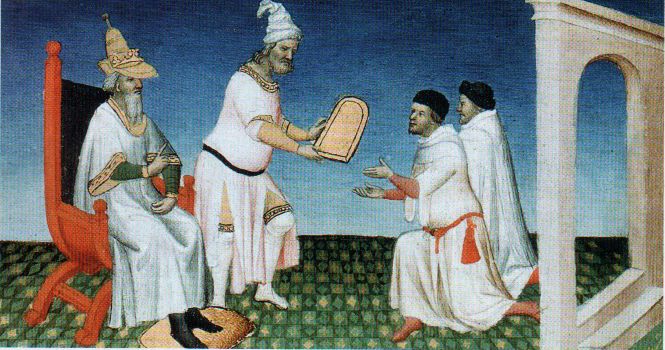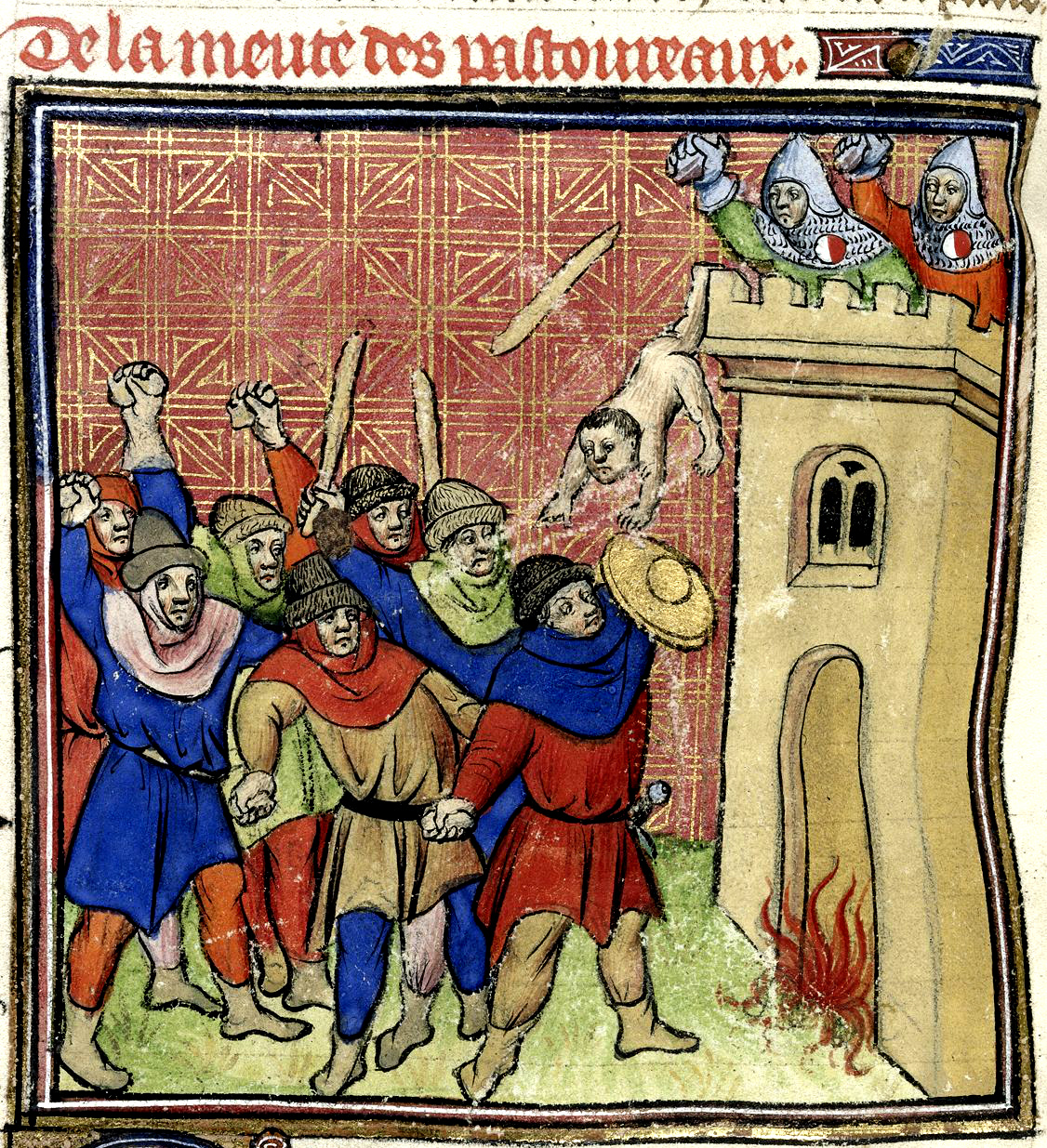
1310 AD to 1330 AD, Psalm 113: The Pastoureaux. (Young Shepherds)
This site was first built in French (see www.147thgeneration.net). The English translation was mainly done using « google translation ». We have tried to correct the result of this translation to avoid interpretation errors. However, it is likely that there are unsatisfactory translations, do not hesitate to communicate them to us for correction.
(for that click on this paragraph)
This generation of the 1310s and 1320s.
According to our count, this generation is the 113rd generation associated with Psalm 113. It is in this Psalm 113 that we therefore find an illustration of the facts of this generation.
In this generation, the Mongols have become masters of China. They don’t want to destroy a civilization they admire. Kubilai retains the Chinese administration and strives to develop the country, he professes great religious tolerance. It opens the doors of China to Europe. Marco Polo (1254-1324), after having been invited to China, writes on his return « the book of wonders » which will be the starting point for a better knowledge of Asia and the introduction into Europe of the many advances. technological and cultural aspects of this continent.
The world is expanding to the east (China and all the eastern territories) and soon will expand to the west (new world). In this world where monotheistic religions will extend their domination even further, the Jews realize that their place is becoming more and more narrow, that exile is entering a phase in which survival will become more and more difficult. Through mysticism, Jews can escape from this world and reach God through the multiple heavens that separate the world below from the world above.
The enviable fate of this generation of Jews from Christian Spain and even Jews from Italy is unfortunately not shared by other Jewish communities in Europe. The fourteenth century that really begins with this generation is a sign of profound change for Europe. This will be marked among other things by famine and plague ending a long period of growth.
The expulsion of the Jews by Philippe le Bel in 1306, more justified by economic considerations than ideological, was canceled in 1315. But this return of the Jews to France was undermined by a new threat resulting from the famine which began that same year. : « The shepherds ». In 1320, the peasants of the North of France, exhausted with misery, set out, aimlessly, towards the South. A young shepherd sees visions, a miraculous bird landed on his shoulder, then turned into a young girl and urged him to fight the infidels. It will therefore be a crusade, and this is how the « Shepherds » Crusade was born. The blood of the Jews flows in Auch, Gimont, Castelsarrasin, Rabastens, Gaillac, Albi, Verdun-sur-Garonne, Toulouse, in other localities too (there is still today near Moissac a place called « Trou- aux-Juifs (Jewish hole) ”- symbolizing a site of massacre of Jews -). According to a Jewish source, one hundred and forty Jewish communities were exterminated by the « Shepherds ».
The Capetian dynasty suddenly died out in this generation. The three sons of Philip IV (Philip IV, known as « Le Bel (the Fair) », 1268/1314), die (1316/1322/1328) in this generation without leaving a male heir to succeed them. This vacancy of the throne is one of the main causes of the Hundred Years War (1337-1353). The fate reserved for the Capetians comes 80 years, or four generations, after the burning of the Talmud in Paris (1242-1244), in accordance with what the psalm associated with the corresponding generation announced.
Talk
China
As the borders of the West and the East are freezing, a new world is opening up.
Primal actor [1] of previous generations, the Mongols have become the masters of China. Kubilai, grandson of Genghis Khan, completed the conquest of the Song territories in 1276 and became emperor by founding his own dynasty: the Yuan Dynasty. The Song Dynasty has been synonymous with many scientific and technical advances. In particular, the progress of the printing industry (xylographic process) contributes to the diffusion of knowledge and to the increase of the literate population.
The Mongols do not want to destroy a civilization they admire: Kubilai retains the Chinese administration and strives to develop the country, he professes great religious tolerance. It opens the doors of China to Europe and thus allows the latter great advances thanks in particular to Marco Polo (1254-1324), son of a family of Venetian merchants. After being invited to China for seventeen years, he writes on his return « the book of wonders » which will be the starting point for a better knowledge of Asia and the introduction in Europe of the many technological and cultural advances of this continent.
It will probably also inspire Christoph Columbus in a few generations to begin his journey which will allow him to discover new horizons.
Extract from the world through Jewish mysticism
This generation sees the diffusion of the Zohar still intensifying and through it the diffusion of a Jewish mysticism which in fact is a response to the fratricidal struggle of the Jews, since the last generation, between strict supporters of the study of Talmud against those who want to open themselves to the secular sciences.
Each camp has prestigious supporters like Ben Adret for the « conservative » camp and Jacob Ben Meir Tibbon for the camp of the « progressives ».
Via mysticism, the Talmud retains a prominent place but without remaining an essential reference. Through the hidden interpretation of the Bible, the new mystics open the way to the study of the sciences which does not contradict the proposed interpretations, without privileging it, but which would be incompatible if we were limited to the Talmudic letter.
The Zohar thus renders within reach of all that was previously reserved for a small circle of initiates. Among the « secrets » unveiled, those concerning the different strata of the divine essence which is among others described in the commentary of the Zohar on the chapter Pékoudé of the Exodus under the title « Traité des Palais (Treaty of the Palaces) ».
This chapter is largely inspired by the vision of Ezekiel supposed to contain the secrets of the divine chariot (Ma’assé Merkavah), long reserved for a circle of very limited initiates, and confirms the notion of « light for the just » mentioned in psalm of the previous generation.
Thus in this world which extends to the east (China and all the territories of the East) and which will soon extend to the west (New World) and where the monotheistic religions will extend even more their domination. The Jews realize that their place is becoming narrower and that exile is entering a phase in which survival will become more and more difficult.
Through mysticism, Jews can escape from this world and reach God through the multiple heavens that separate the world from below to that from above.
With this feeling of being through the faith and prayer thus saved from the world down here, the Jews will be able to cross more easily the generations to come and thus survive all the vicissitudes that await them. These would have easily overcome a people as fragile if he had not kept the connection with his God.
This is what the beginning of the Psalm of this generation expresses:

- Hallelujah! Praise, you servants of the Lord, praise the name of the Lord.
- May the name of the Lord be blessed from now and to eternity.
- From the rising of the sun until its setting, the name of the Lord is praised.
- The Lord is high over all nations; upon the heavens is His glory.
- Who is like the Lord, our God, Who dwells on high,
- Who lowers [His eyes] to look in the heavens and the earth?
- He lifts the pauper up from the dust, from the dungheap He raises up the needy,
- To seat [him] with princes, with the princes of His people.
In the last quoted verse of the psalm of this generation, the allusion to the « great ones of his people » (princes of His people) is all the more appropriate in that in the description of the palaces we meet, according to the levels attained, the different great personages of the Jewish people :
- When [2] Jacob entered this sixth palace […]. The world was not strengthened until Abraham entered this palace. […]. Isaac also entered this palace. […] Joseph the righteous has become attached to the Column of the middle which supports the world.
Recall that if it is difficult to know the date of creation of the Zohar, and even if it were the work of Moses de Leon, it is obvious that it would only resume an old tradition in the interpretation of certain passages of the Bible such as the vision of Ezekiel.
This interpretation, which provides the description of the seven heavens and consequently of a certain vision of the strata of paradise with which is associated an equivalent description of the strata of hell (empire of the devil) probably inspired the description of the « Night Journey » of Muhammad in the Muslim world and especially Dante in the writing of his work « The Divine Comedy » that he will refine until his death in 1321 is during the present generation.
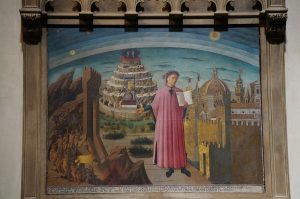
Like the Zohar’s « Treaty of the Palaces, « The Divine Comedy » makes a prodigious description of heaven and hell. As in the Jewish version where the main biblical characters are found, and the version of « The Night Journey » where Muhammad meets the main prophets, in his initiatory journey Dante also meets a hundred characters, but this time the list is rather inspired by the Christian history (encompassing Greek antiquity).
Dante’s work – the first great work written in Italian – has an obvious influence on Christian thought, especially in terms of redemption. It will also be a significant contribution in the outbreak of the Renaissance, which will begin in Italy, home of Dante. Graetz in his description of this time puts in parallel the work of Dante and that of Immanuel ben Salomon Romi, protected Jew of Robert of Anjou.
Graetz following this evocation of the favorable cultural breeding ground in Italy also evokes the Christian Spain, one of the last European lands favorable to the Jews which will not remain it eternally.
« From famine, pestilence and war, deliver us, Lord »
The enviable fate of this generation of Jews from Christian Spain and even Jews from Italy is unfortunately not shared by other Jewish communities in Europe. The fourteenth century, which is really beginning with this generation, is a sign of profound change for Europe. This will be marked among others by the famine and the plague ending a long period of growth.
These « misfortunes » will affect the entire European population. But the Jews will suffer doubly these events, directly like the other populations and indirectly because these other populations will let off steam of their misery on the Jewish population massacring unceasingly for various reasons the survivors of this one.
This fourteenth century in Europe (« from the north ») can be summed up as follows:
- « From famine, plague, and war, deliver us, O Lord » [3], such is the prayer of the men of the fourteenth century, overwhelmed by the misfortune of the times.
- The economic boom experienced by the West from the 10th to the 13th century is exceptional in its scale and duration. The clearings and the general reorganization of the terroirs allow a tremendous increase of the production, which favors the increase of the population. The cities, almost disappeared from Europe in the 10th century, are resurging.
- However, at the end of the thirteenth century, a diffuse concern seized the spirits. Demographics are stagnating everywhere and the population is starting to decrease, although the movement is less clear where, as in Spain and Italy, there is still land to be developed. The number of children per family is decreasing; we usually get married later, which further reduces couples’ fertility and increases the number of single people. It is true that subsistence difficulties appear: everything has been cultivated, even the poorest or coldest lands. All is occupied by cereals (rye, barley, meslin) necessary to provide all the broth and cake that some onions or a piece of bacon barely enrich. Other crops and livestock are kept to a minimum. The only result of the cultivation of the bad lands is, in fact, the general lowering of the yield of agriculture. A series of poor harvests, caused by a succession of rainy summers, led to the return of famine in 1315. Even the large Flemish cloth cities, Ghent, Ypres and Bruges, though exceptionally rich, saw part of their population disappear (10 % of the population of Ypres in six months, in 1316). Scarcity also raises prices even as the continuous depression in the cities leads to unemployment and lower wages.
The crusade of the Shepherds
The expulsion of Jews by Philip the Fair in 1306, more justified by economic than ideological considerations is canceled as early as 1315. But this return of Jews in France is undermined by a new threat resulting from the famine that begins that same year : « The Pastoureaux (old french word for young shepherds):
- In 1315 [4], a terrible famine, the worst probably of history, fell on Europe. The summer of 1314 was rainy and that of 1315 was a real deluge: the harvest was catastrophic, and where, as in Flanders, vast areas were flooded, it was almost zero. […] The famine was such that in Paris, in Antwerp, people died by the hundreds in the streets, and the desolation was not to be less in the villages: the cases of cannibalism were frequent. […] The harvests of 1316 and 1317 were also bad, so that it was not until 1318 that there was an improvement: but the consequences of the calamity, epidemics, social disorders, were still felt a long time In certain regions.
- It was then that in 1320, the peasants of the North of France, exhausted of misery, left their isolated homes and set off, hoping to improve their lot: where are they going? They do not know it themselves; in the end, they move towards the South, always more lenient, and their movement amplifies, it snowballs; preaching monks, just as hungry as the peasants, introduce mystical accents, ideological significance … A young shepherd has visions, a miraculous bird landed on his shoulder, then turned into a young girl and urged him to fight the infidels; it will be a crusade, and this is how the Crusade of the « Pastoureaux » is born. On the way, the troop lives on the inhabitant, it loots, and since it is about a crusade, it is to the Jews that it attacks preferably. Without knowing exactly how, the « Pastoureaux » reach Aquitaine, where the story of their business is illuminated: the chroniclers have left us detailed accounts of their misdeeds in this province. The blood of the Jews flowed to Auch, to Gimont, to Castelsarrasin, Rabastens, Gaillac, Albi, Verdun-sur-Garonne, Toulouse, without the royal officials seeking to intervene, and it seems, with the mute approbation of the people; in other localities too (there is still today near Moissac a place called « Trou aux Juifs » – symbolizing a site of massacre of Jews -). […]
- According to a Jewish source, 140 Jewish communities were exterminated by the « Pastoureaux » (as we know, the statistical information provided by the medieval authors are highly questionable: they still tell us a order of magnitude, and give us a glimpse of the impression that events had on contemporaries).
The extinction of the Capetian dynasty
Far from wanting to be forgiven for these massacres, in the countries accomplices of these, one sees on the contrary a will to be protected from retaliation of the Jews, far from the reality. This is how Poliakov analyzes the following cases in France (the author quotes Vitry le François and Chinon).
The Capetian dynasty suddenly died at this generation:

- After [5] a phase of long reigns and relative stability, another was opened of accelerated successions, marked by many uncertainties. In the space of fourteen years, three sons of Philip Le Bel succeeded each other on the throne of France, « all grand and beautiful like their father », Louis X le Hutin (1314-1316), Philippe V le Long (1316-1322 ) and Charles IV Le Bel (1322-1328). […] None of the three son of Philip IV left no male heir who could succeed him. […]
On his death, Charles IV had left Jeanne d’Evreux pregnant. In case she gives birth to a girl, two competitors could claim to the Crown: Edward III (already king of England) as grandson of Philippe le Bel by his mother Isabelle, and Philippe de Valois, son of the very influential Charles de Valois (died in 1325) and nephew of Philip Le Bel. […]
Jeanne d’Evreux gave birth to a girl on April 1, 1328 and it was Philippe de Valois who was crowned on May 29.
The real reasons for Edward III’s failure are now well known. Legally his mother, whose licentious behavior had shocked the French baroness, could not transmit to her rights that she was not able to exercise.
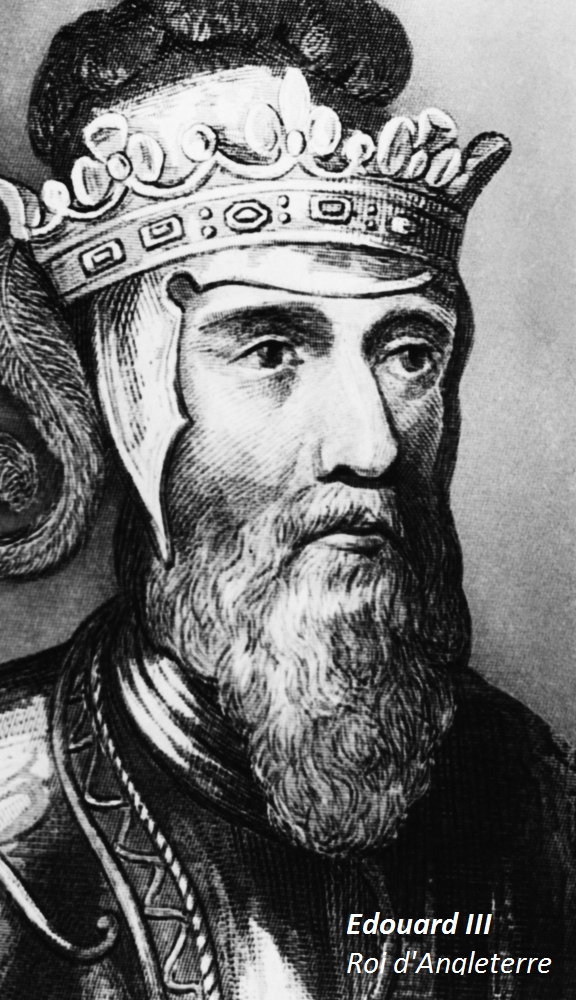
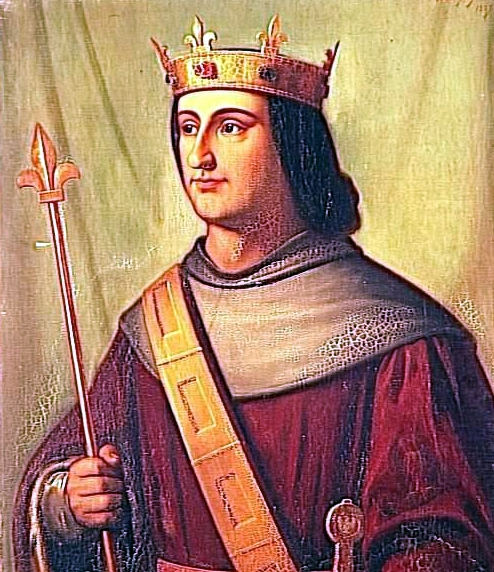
This decision frustrates the King of England and is one of the main causes of the Hundred Years War that will oppose for more than a century England and France:
- The decision [6] of the assembly of 1328 (which allowed Philippe de Valois to succeed Charles IV) may well be imbued with wisdom, Edward III was convinced of his good rights and made it known as early as May 1328. By this date the feudal feud had turned into a dynastic conflict which itself concealed the antagonism of two monarchies in search of their « natural » areas of domination. This confrontation was brightened by the economic competition of two emerging nations for the control of some key products, such as wine, salt and wool. It took a century of war to decide such a dispute.

In fact, the fate reserved for the Capetians, which intervenes four generations after the burning of the Talmud in Paris, corresponds to a part of the curse announced by the psalmist in Psalm 109, that of the generation of the burning of the Talmud:
(extract of the psalm 109 associated to a previous generation, verses 13 to 14 )
- May his end be to be cut off; in another generation may their name be blotted out.
- May the iniquity against his forefathers be remembered by the Lord, and may the sin against his mother not be erased.
Recall that if the burning of the Talmud took place between 1242 and 1244, the final verdict was pronounced in 1248 is exactly 80 years (four times twenty years) before the death without heir (1328) of the last Capetian king. The four generations were well marked by an anti-Jewish policy like that of Louis IX which justifies the punishment of the fault of the « father » (since it is reproduced by his children).
This feeling of curse of the Capetians associated with the fate that the kings of this dynasty reserved for the Jews is also shared by the Christian people of the time:
- Charles IV [7], the last of the Capetians, was then dead, and with Philip VI began in France the reign of the Valois dynasty. It is interesting to note in passing that even among Christians, it was believed that Philip the Fair, by his cruelty to the Jews, had called divine wrath on his descendants and thus caused the extinction of the Capetians.
The end of the psalm of this generation confirms this diagnosis:

- He seats the barren woman of the house as a happy mother of children. Hallelujah!
The barren woman who sits is indeed the queen who is sterile because she can not give a male heir. As for the many sons, they correspond to all the states that will hatch after that, in the pain of the Hundred Years War.

[1] According to (preface by) Georges Duby: « A history of the medieval world ». (French: « Une histoire du monde médiéval » ).
[2] (Maisonneuve and Larose Publishing, Book IV) The Zohar, Appendix to Chapter Pékoudé « Treaty Center, » page 256b to 257b (original numbering). (French: Le Zohar – Livre IV, Appendice au chapitre Pékoudé : « Traité des Palais », page 256b à 257b (numérotation d’origine). (p. 290 à 291, numérotation livre) ).
[3] (preface by Georges Duby): « A history of the medieval world ». Chapter: « Old Empires and Young Nations, Great Mutations, 1300-1492). (French: « Une histoire du monde médiéval ». Chapitre : « Vieux empires et jeunes nations, Grandes mutations, 1300-1492). (p. 329-330) ).
[4] Léon Poliakov: « History of anti-Semitism: from Christ to court Jews ». (French: « Histoire de l’antisémitisme : du Christ aux Juifs de cour ». (p. 118 à 120) )
[5] (collective) « The Capetians – History and Dictionary ». Chapter: « The last Capetians, 1314-1328 ». (French: « Les Capétiens – Histoire et Dictionnaire ». Chapitre : «Les derniers Capétiens, 1314-1328 ». (p. 429 et 443) ).
[6] (collective) « The Capetians – History and Dictionary ». Chapter: « The last Capetians, 1314-1328 ». (French: « Les Capétiens – Histoire et Dictionnaire ». Chapitre : «Les derniers Capétiens, 1314-1328 ». (p. 446) ).
[7] Henri Graetz: « HISTORY OF THE JEWS / THIRD PERIOD – DISPERSION ». Second time – Science and Jewish poetry in their prime. Chapter Ten – Progress of Bigotry and Cabal (1270-1325). (French: « HISTOIRE DES JUIFS / TROISIÈME PÉRIODE — LA DISPERSION ». Deuxième époque — La science et la poésie juive à leur apogée. Chapitre dix — Progrès de la bigoterie et de la Cabale (1270-1325) ).

